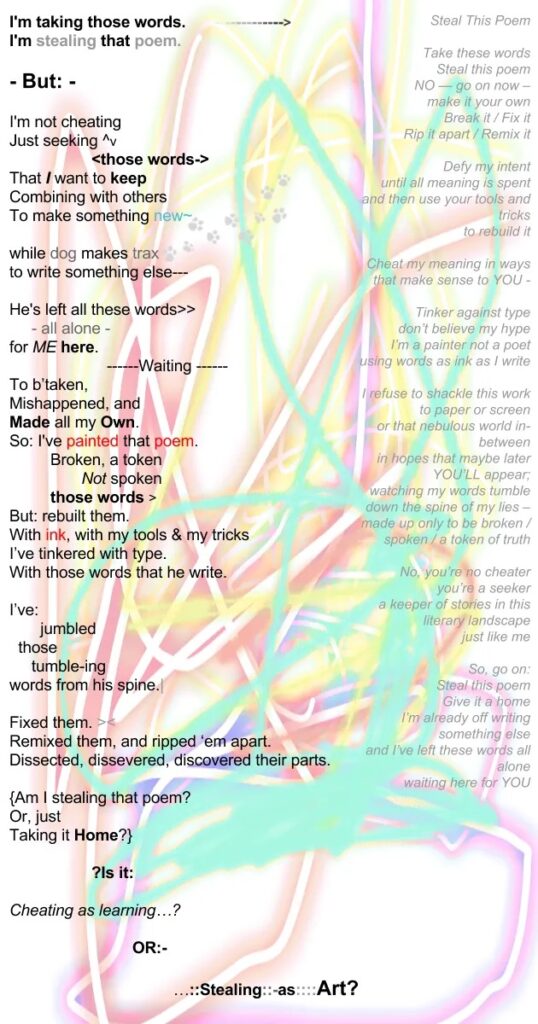Summary:
Remixing can enhance or amplify the original art, and extra value can be gained by pairing your remix with a written reflection. Originally published on April 14, 2020
Remix, in my view, should be seen as a high form of compliment.
Whenever someone takes the work of someone else and turns it into an echo or reverberation of the original, the Remix amplifies the Art. I write this, knowing full well that not everyone who has their art remixed by others feels as strongly as I do. Some people believe their art demeaned, or devalued, or intruded upon by remix. It’s a delicate balance in a media-saturated world where art flows (mostly) free. I have found that remixing someone else’s work out of deep appreciation for the original, and then reflecting on the act of the remix as commentary, is one way to alleviate the tension that can arise between writer/artist/poet and remixer.
Some remixers ask for permission first. Others ask for forgiveness later. Truthfully, I have taken both roads. I admit that I have felt ethical tension in whatever direction I have gone for fear of ruining the magic of the creative moment: theirs, in the original, and mine, in the offshoot.
For years, in affinity networks and spaces like CLMOOC (Connected Learning Massive Open Online Collaboration), Rhizomatic Learning, DS106 and Networked Narratives and others, I have often played the role of the remix poet. I have sought to show appreciation through the emergent work of fellow participants by making Found Poems from others’ stories, weaving stanzas around a main Anchor Sentence, engaging in creative discussions of rhyme and repetition and free verse, and more.
Once, I even launched a purposeful invitation for remix through the Rhizomatic Learning network that I called Steal This Poem (with hat nod to activist Abbie Hoffman’s Steal This Book). I openly encouraged anyone to do whatever they wanted with the poem, which was themed on Remix. Many took me up on the offer, taking the poem for a walk in so many directions, surprising me at every turn. There were visual art interpretations, digital video poems, audio versions, poetic dialogue, revamped text alternatives and more.
If you live remix enough, it becomes part of the way you respond to art. For example, a Writing Project and long-time network friend, Sheri Edwards, had written a blog post about wandering through a small city, noticing in words and images some of the smaller moments. I was struck by a particular image in her post, of a man reaching down to play a community sidewalk piano. Using Sheri’s post as inspiration, and the image as a remixable moment, I crafted both a musical score and a small poem as digital art called Piano Keys, sharing it back with Sheri as a gift of appreciation in my reflection, if not appropriation.
Unlike the quiet interaction between writer and reader, a courtship that still has value, the remix efforts from reader to writer is a more overt Love Letter. A remixer finds a poem inside the work of someone else, like a seed just waiting to bloom into a flower.
Invitation to Remix
Find a text that hits you in all the emotional right ways. Heck, you can even steal my poem. Imagine a poetic means to engage with the text from a slight angle. Maybe your remix poem uses some of the wording of the original, but cushions it with something new. Maybe your remix poem is one built for two or more voices, The remixer in conversation with the Writer. Maybe you take the original and pull pieces of it into a new media format — as a video project, an audio version, a comic, a photograph.
Whatever the kind of remix, try to let the shadows of the original be integrated into your work, and of course, always remember to credit the original art and the writer in what you make. If you can, reach out and let them know that their words and their ideas fueled your creativity. Oh, and of course, you can always remix your own work, too. Ask forgiveness of yourself later.
Reflection
I find that the most valuable element of remix is the reflection point afterwards. Spending time writing or analyzing the decisions one has made in choosing phrases or media or approaches is what gives the remix some substance, moving the remix poem from a knock-off of the original to something richer and more deeply ingrained in the process of making something new out of something that already existed.

